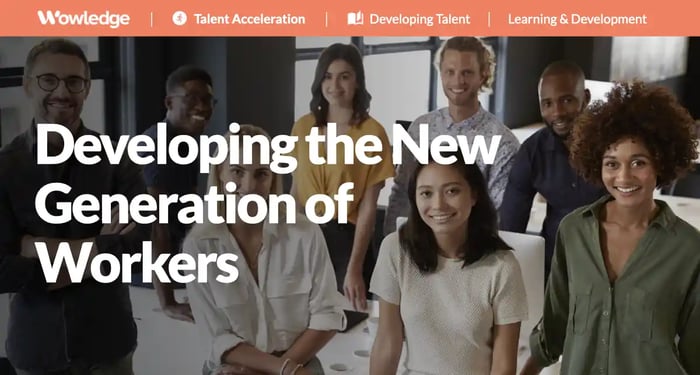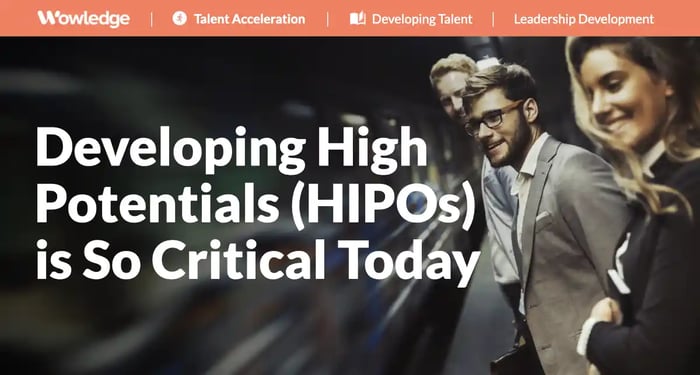Table of Contents
- Understanding millennials in the workplace
- What is unique about Millennial managers and leaders?
- What are the main issues facing Millennial managers?
- What steps should be taken to support Millennial managers in their roles?
- Final thoughts on the development of Millennial managers
- Relevant Practices & Tools
- FAQs
-
A major generational shift is underway, with the peak of the largest generation ever—the baby boomers now above retirement age, with the smaller Gen X rapidly following in its footsteps. In fact, the Millennials who were born between 1981 and 1996 have already taken over as the largest segment of the population. Estimates place that generation with about 75 million Americans and 2 billion worldwide. The implications for the workplace are enormous, with credible estimates ranging between 43 to 75 percent of the global workforce is expected to be made up of Millennials. That means of course, an increasing proportion of millennials as managers.
What Millennials are bringing to the workplace are markedly different attitudes, values, and preferences. Those are largely shaped by the forces that occurred during their formative years, including the digital revolution, the “great recession,” enormous student debt loads, and more recent socio-political upheaval, a global pandemic, mass hiring and layoffs, and recession fears. And living through such times, they bring a very different set of expectations and managerial strengths that need to be accounted for and leveraged as more and more of them rise into senior leadership roles.
While estimates vary, several studies have concluded that Millennials as managers are increasingly filling the management ranks. For example, according to research by the Harris Poll for Zapier, 62% of Millennial workers saying they have direct reports, Deloitte reports that 60 percent have direct reports, and Korn Ferry estimates that between 5.2M and 11.2M are currently in management roles.
Especially concerning is the appearance of a lack of preparation that Millennials as managers have access to as turnover rates remain high (including among managers caught up in pandemic challenges), managerial ranks being thinned by major employers, and the rapid retirement rates of the preceding generations. Recent reports suggest that millennial leaders are not receiving the development they need: they make up only 28% of leadership development participants, and 69% of millennials feel a lack of leadership development opportunities, according to the recent HRPA Millennials Report. So, what can be done to better support millennials as managers?
Understanding millennials in the workplace
As much as understanding the factors that formed the opinions, preferences, and biases of this generation, certain unique elements of its “persona” (as much as one can infer those across a population that large, of course) have emerged through what pundits are referring to as the most studied generation. Several trends have emerged about them.
The most profound is that they tend to seek purpose and meaning in their work. Much has been written about addressing social equity, respecting diversity, and providing environmental, social, and governance (ESG) balance to company goals and operations. However, as a segment of the workforce, making that clearly relevant to the individual work they are performing, providing opportunities to exercise their values in the context of their work lives is important. In fact, a 2021 millennial survey by Deloitte reported that two-thirds (2/3) of millennials chose their workplace because their purpose aligned with that of the organization.
Secondly, due to the fact that they were raised as digital natives, with instant access to information, entertainment, and shopping, they expect to have ready access to data, insights, communications, work-related information and the associated technologies to make their work more effective and efficient. They tend to be heavier users of mobile technology than their forebears, and as a result, rely on such information at their fingertips. To address that, employee experience (EX) approaches are critical to understanding their needs and adapting systems, processes, policies, and programs to better meet their unique preferences.
Thirdly, career development and advancement are highly valued by a majority of millennials. Another survey found that 72% of millennial workers value those and insist on feedback, coaching, and learning/growth opportunities as reasons to stay with an employer.
Finally, millennials value flexibility in their work and workplaces. Fewer layers of management, flexible work locations and schedules, accommodating individual needs, and respecting diverse opinions and styles are all hallmarks of the Millennial mindset. They embrace policies and practices that focus on work-life balance and psychological well-being. They tend towards more collaboration and less competition than the previous generations.

What is unique about Millennial managers and leaders?
Leadership roles are attractive to Millennials primarily due to the ability to both make more money and work in roles that empower them to make decisions and take action. Older research suggests that over 90% aspired to managerial roles, although the burnout rate appears higher amongst the population. The primary differences in this generation appear to be that Millennials as managers are:
1. Highly collaborative and inclusive
Millennial managers tend to create a highly collaborative and consensual work environment in contrast to the “command and control” style practiced more frequently by baby boomers. They value diversity, actively seek group input, and value consensus and a shared vision of directionality.
2. Comfortable providing feedback
Having been raised in a world with special coaching and tutoring on a wide variety of entertaining (e.g., sports, arts) and pre-professional (e.g., internships) activities, they are used to receiving targeted feedback and skills refinement. Their role models taught them the value of both giving and receiving personalized guidance in their endeavors. They make excellent coaches.
3. Used to leverage data to inform decision-making
As digital natives, ready access to facts and insights from a wide range of sources is deeply ingrained in their world. As managers, they are used to leveraging such information for the betterment of their employees, customers, and community.
4. Actively challenging the status quo
Having grown up in the digital age, they are used to being aware of a wide range of ideas and positions on a given issue or challenge. And they are self-assured and more willing to change jobs than previous generations if what they value is not experienced. As a result, they tend to seek continuous improvement and breakthrough solutions that impact the larger mission and objectives.
5. More likely to focus on building a positive culture
Given their own preferences for alignment between their individual, corporate, and societal values, they are more apt than previous generations to provide and communicate larger meaning and purpose to their employees. According to Deloitte, they are most interested in developing a culture centered on transparency, purpose, well-being, and trust, resulting in large-scale worker initiatives being launched by their respective HR functions.
6. Technologically proficient
Millennials are often considered the first "digital native" generation, having grown up with technology and the internet. They are generally more adept at using digital tools and have a natural affinity for incorporating technology into their work processes. As a result, they are early adopters of new technologies and can drive this throughout their organizations as champions and ambassadors.
7. Supportive of flexible workplaces and work arrangements
With a generational desire for work-life balance, Millennials prioritize it and are more inclined to provide flexible work arrangements that allow their team members to pursue personal interests, family time, and leisure activities while maintaining their professional responsibilities.
8. Continuous learners
Based in part on their boomer parents pushing them towards extracurriculars to better position them for competitive school acceptances and jobs, they place a high value on continuous and extracurricular development. They are supportive of their teams’ developing new skills and value ongoing learning opportunities for everyone.
9. Supporters of corporate involvement
Millennials tend to be passionate about social, community, and environmental causes. As such they are more likely to support company commitments to socially responsible causes and make excellent external ambassadors.
In general, this generation has strengths that can be leveraged for more modern and adaptable practices that address the preferences of both their peers as well as those of the next emerging generation of workers (“Generation Z”) who are/will soon be reporting to them.
What are the main issues facing Millennial managers?
Millennial managers are facing a unique set of challenges in the workplace. Some of the main issues that millennials as managers were grappling with include:
Cross-generational management: Millennial managers often find themselves leading teams comprising individuals from different generations, including older colleagues who may have different work styles, values, and expectations. Bridging the generation gap and ensuring effective communication can be a challenge.
Work-life balance: Millennials, as a generation, place a strong emphasis on work-life balance. As managers, they may face difficulties in balancing their own work-life needs while ensuring their team members are also supported in this regard. Corporate policies, practices, and cultural pressures are often lagging in this regard.
Lack of experience: Some millennial managers might be promoted to managerial positions at a relatively young age, leading to concerns about their perceived lack of experience, skills, and especially the potential challenges in earning the respect of older team members.
Career advancement: Millennials are known for their desire for continuous growth and development. As managers, they may struggle to find clear career paths or opportunities for advancement within their organizations.
Leadership and decision-making: Millennials may face expectations to demonstrate strong leadership skills and make tough decisions while simultaneously practicing their preference for fostering a collaborative and inclusive work environment. This may be exacerbated by requirements to participate in staff layoffs and manage under baby boomer or Gen X leadership with more command-and-control values.
Employee engagement and retention: With a greater focus on company culture and employee satisfaction, millennial managers may be tasked with keeping their teams engaged and motivated to reduce turnover rates.
Dealing with burnout: Millennial managers, like other employees, can experience burnout due to high workloads, long hours, and the pressure to achieve work-life balance. As discussed, the data support the notion that they are experiencing it at a higher level than those from other generations, and their increasingly millennial-populated teams need to be managed accordingly.
Navigating remote work and virtual teams: The pandemic accelerated the shift to remote work and virtual teams, while corporate leadership teams are increasingly working to claw employees back into onsite work. Millennial managers have to adapt and find ways to maintain productivity and team cohesion when their preference is to work collaboratively and retain maximum flexibility in where and when the work gets accomplished.

What steps should be taken to support Millennial managers in their roles?
Keeping in mind the skill sets and preferences of this new generation of managers and leaders, an opportunity exists to improve the context and design of those jobs. Target the goal of better leveraging their capabilities and expectations while reducing the previously mentioned burn-out that can lead to turnover within their ranks. To attract and retain millennial managers, companies should consider the following strategies:
1. Offer flexible work arrangements
Offer flexible work schedules, remote work options, or a hybrid model. This supports millennials' desire for work-life balance and can boost their productivity and job satisfaction. Provide flexible options that these managers can offer to their team members as a show of support and awareness of individual needs.
2. Emphasize purpose-driven work
Highlight the company's mission, values, and social impact to align with millennials' desire for meaningful work. Ensure that the management roles actively connect them to the organization's broader purpose in job descriptions, external/community objectives, and special internal projects and contributions. Arrange the goal-setting process to support the linkages between superordinate goals to their own, while enabling them to do the same for their employees using a cascading goals process.
3. Provide continuous learning opportunities
Invest in training and development programs that allow millennial managers to enhance their skills and grow professionally. Offer mentorship and coaching to support their skill and career progression. Provide them with training and guidance to offer effective professional and career development counseling to their subordinate employees.
4. Encourage collaboration and cross-functional teamwork
Create a work environment that fosters collaboration, team building, and diversity of thought. Provide opportunities for project and teamwork that engage them with employees across business units, locations, functions, and job levels. Consider this an opportunity to leverage their strengths as collaborators while expanding their development.
5. Promote autonomy and empowerment
Give millennial managers autonomy in decision-making and empower them to take ownership of their projects and initiatives. Promote a sense of trust and responsibility by redesigning job roles, pushing decision-making discretion further down into middle management, and reducing unnecessarily bureaucratic processes and practices. Engage them in identifying blockages to their own productivity through employee listening activities and process improvement projects.
6. Offer career progression paths
Define transparent career paths with opportunities for advancement and leadership roles. Promote lateral mobility and career lattice thinking by formally identifying the skills overlaps and transfers between different job functions, roles, and job levels. Regularly communicate internal growth opportunities within the company by using internal job postings, talent marketplace technologies, intelligent job matching, and enabling the internal “recruitment” of qualified candidates for new roles. Monitor the job tenure of managers and encourage them to take non-management roles every few years to avoid burnout and turnover.
And extend the thinking towards a systemic evolution of workplace strategies and practices that are designed to attract and retain the Millennials as the now largest segment of the workforce. Broader practices that align better with millennial values include:
- Prioritize work-life balance initiatives. Provide benefits such as paid time off, wellness programs, and mental health support.
- Encourage open communication and transparency. Create a culture where open communication is valued, and employees feel comfortable sharing ideas, concerns, and feedback with management.
- Foster a culture of feedback and recognition. Establish regular feedback and coaching standards while providing fair and transparent performance evaluation and reward systems. Offer competitive compensation and consider non-monetary incentives that resonate with millennials, such as opportunities for professional development or sabbaticals.
- Embrace diversity and inclusion. Create a diverse and inclusive workplace that welcomes individuals from all backgrounds.
- Support work with a social purpose. Engage in corporate social responsibility initiatives that allow millennials to contribute to societal or environmental causes through their work.
Final thoughts on the development of Millennial managers
Given the research that suggests that leadership and management development of Millennial managers is highly desired but offered at a surprisingly low rate, leverage three key elements of learning and development that appeal to the strengths and preferences of millennials:
Offer more work-based, informal learning opportunities
Provide Millennial managers and high-potentials (HIPOs) experiences as special project managers, provide skill and career coaching, assign mentors from a pool of more experienced and capable leaders, identify new skill research and reading assignments, and provide job shadowing opportunities.
Offer flexible learning and development programming
Exploit Millennials’ preference and motivation for self-driven learning by expanding online education programs focused on leadership and management skills and competencies such as strategy development, corporate finance/marketing/sales/operations, process improvement methodologies, business analytics, etc.
Focus development on soft skills
Recent research reported by Korn Ferry and Deloitte suggests that a significant gap in a number of soft skills (interpersonal, critical thinking, conflict management, creativity, and others) exists among the millennial and Gen Z populations. Such development will help round out the future leaders in those employee segments and prepare them for significant management roles in the future.
Relevant Practices & Tools
Core Leadership Development Practices to Define and Structure Leadership Capabilities. >
Leadership Development (LD) is the strategy and process of developing the key skills, capabilities, and styles needed by top leaders to successfully drive organizational performance and... more »
Core Career Development Practices that Translate Employee Ambitions into Occupational Progression Action Plans. >
Core Career Development is a process through which employee development is guided towards a targeted series of successive job roles that build upon one another and provide continued... more »
Developing Leaders Across Multiple Levels of Management. >
Advanced leadership development is designed to not only develop current executives, but "leaders" in all levels of the organization... more »
Targeting Critical Skills Employees for Coaching and Mentoring to Enhance Business Results. >
Coaching and mentoring are best used for the development of key role-holding employees, as evidenced in part by their widest use with top executives in corporations... more »
The Manager Coaching Feedback Survey Tool: Define and Apply Basic Questions for Employees Providing Feedback on Managers' Coaching Prowess. >
This tool functions as a guide to developing questions to assess the extent to which a line manager is providing quality coaching during regular performance check-in or formal discussions... more »
FAQs
What capabilities should leadership programs add for first-time millennial managers?
Programs should emphasize evidence-based decision-making, performance coaching, and conflict resolution, alongside fundamentals such as budgeting and capacity planning. Scenario lab sessions that simulate real employee issues, such as feedback conversations, pay decisions, and goal trade-offs, build judgment faster through practice and feedback than classroom content alone. Rotating mentors from finance, operations, and legal broadens commercial acumen and reduces blind spots. Require capstone projects tied to current and near-term business priorities to ensure practice translates into results.
What metrics indicate millennial managers are succeeding?
Leading indicators include cycle time for decisions, team goal achievement, and coaching frequency correlated with skill gains. Outcome metrics should track team retention of high performers, quality or service SLAs, and contributions to revenue or cost targets relative to their peers. Employee and team health checks, such as engagement, burnout risk, workload balance, and internal mobility out of the team, reveal whether performance is sustainable. A quarterly “manager effectiveness” pulse that blends employee input with business data provides a balanced view.
What prevents burnout among millennial managers without lowering standards?
Clear prioritization from senior leaders limits initiative creep and gives managers cover to say “not now.” Workload dashboards that report on and expose meeting and administrative loads, span of control, and after-hours activity enable targeted rebalancing. Shared services for routine approvals and automated status reporting return time to coaching and problem-solving. Encouraging periodic role resets—short rotations or project tours—refreshes energy while building range.
How can HR use technology to amplify millennial managers’ strengths?
Modern tools can consolidate team metrics, skill inventories, and hiring pipelines into one view, making data-driven decisions natural and efficient. Automated “nudges” that prompt timely feedback, recognition, or career conversations convert good intent into consistent habits. Internal talent marketplaces align stretch assignments with skill gaps, helping managers grow people without headcount increases. Lightweight analytics that connect management behaviors to performance outcomes reinforce disciplined experimentation.










